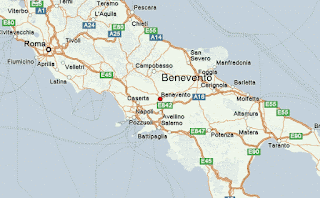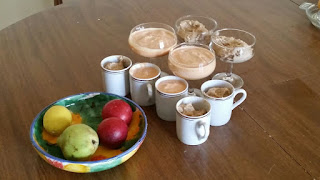


It's late October and I'm feeling mellow and in the mood for fruit. I've just come back from Grenada where I've enjoyed the most exquisite fig mousse in my life. Recipe selected, downloaded and I on a roll.
Cycling along the leafy lanes around Capua, fragrant with Pine, I notice that there is still plenty of fruit. On the trees the ripe pomegranates glisten like bright red rubies. The olives are turning black, the lemons yellow , the oranges orange. Still plenty of flowers; even flowers of Zucca- good to eat. But where are I fichi? Where are the grapes? Where have I been? Autumn is almost over
 Indeed the season is passing swiftly after the longest and hottest summer on record. Now a cool 25-27 degrees in the afternoons, with cool mornings and evenings. Lucifero has legged it. But all is not well in Eden. My Arcadian autumn has been spoiled. I can not eat the forbidden fruit.
Indeed the season is passing swiftly after the longest and hottest summer on record. Now a cool 25-27 degrees in the afternoons, with cool mornings and evenings. Lucifero has legged it. But all is not well in Eden. My Arcadian autumn has been spoiled. I can not eat the forbidden fruit.
What should I do? What would Eve have done? Quit the garden? Talk to the Almighty? Munch some Galaxy? A sticky issue i
ndeed!

What better way of combining all three than by going on pilgrimage? Yes they have recently undergone a resurgence in popularity. The Dean of Canterbury Cathedral describes them as offering: 'An ancient tradition in tune with today's needs, (which) gives us a ch
 ance to 'walk through' those issues we have on our minds... (and) help us to focus on ‘what really matters’ and to rediscover the joy of giving and generosity. And to have a greater appreciation for life’s gifts'.
ance to 'walk through' those issues we have on our minds... (and) help us to focus on ‘what really matters’ and to rediscover the joy of giving and generosity. And to have a greater appreciation for life’s gifts'. 
 And east of Eden I'm spoiled for choice. At the northern edge of the province of Campania - in the small town of Pietrelcina- there lies the birthplace of Italy's most famous modern day saint, Padre Pio (1887-1968). Born Francesco Forgione, he was given the name of Pius (Pio in Italian) when he joined the Franciscan Order of the Minor Capuchin. He was a friar, priest, stigmatist and mystic. Eventually he was canonized by Pope John Paul 11 in 2002 and became a saint.
And east of Eden I'm spoiled for choice. At the northern edge of the province of Campania - in the small town of Pietrelcina- there lies the birthplace of Italy's most famous modern day saint, Padre Pio (1887-1968). Born Francesco Forgione, he was given the name of Pius (Pio in Italian) when he joined the Franciscan Order of the Minor Capuchin. He was a friar, priest, stigmatist and mystic. Eventually he was canonized by Pope John Paul 11 in 2002 and became a saint. And what a saint he was! Persecuted much of his life by both the devil and the Catholic Church itself- who said he'd used carbolic acid to create his stigmata- he continued to dedicate his life to God until his death. Padre Pio spent 25 years in poor health planning the building of a hospital in San Giovanni Rotondo, to be named the Casa Sollievo della Sofferenza or "Home to Relieve Suffering." The hospital opened in 1956. Padre Pio's detractors used even this project as another weapon to attack him, charging him with misappropriation of funds.

Bishop Wojtyła (later Pope John Paul II) wrote to Padre Pio in 1962 to ask him to pray for Dr. Wanda Poltawska, a friend in Poland who was suffering from cancer. Later, Dr. Poltawska's cancer was found to be in spontaneous remission. Medical professionals were unable to offer an explanation for the phenomenon. And likewise of his stigmata, which was a cause of shame for the man, and which he chose to keep covered. Food for thought indeed!
What struck me particularly, though was the poverty and sanctity of his family. They were illiterate peasants who lived in a style of house that hadn't changed much from its counterpart in Nazareth. Yet they imparted as much as of the Bible as they could remember to their children and attended mass daily. When the young Francesco expressed a desire to become a Franciscan friar, his father visited
 the local friary and asked them if they'd take his son. When told he had to be better educated first, he was not discouraged. He went to America to find work raise the money to pay a private tutor for his son. And this was an illiterate man, who lived in a two roomed house, travelling from a hilltop Italian town to America in the 1890s. Not to make his own fortune- like so many others- but to enable his son to take up his calling from God! Practically a saint himself! Food for thought indeed!
the local friary and asked them if they'd take his son. When told he had to be better educated first, he was not discouraged. He went to America to find work raise the money to pay a private tutor for his son. And this was an illiterate man, who lived in a two roomed house, travelling from a hilltop Italian town to America in the 1890s. Not to make his own fortune- like so many others- but to enable his son to take up his calling from God! Practically a saint himself! Food for thought indeed!
 And for me, its the much shorter journeys back to Eden. On the way back we take a detour to take in the beautiful seaside town of Polignano, famous for the sensational restaurant carved out of the clifftop. Yes! Wow! Here dinner starts at 150 euros a meal, sense vino. A world away from Padre Pio- who ate rested on his way to the fields with his sheep- to eat the bread his mother had lovingly wrapped in a clean cloth.
And for me, its the much shorter journeys back to Eden. On the way back we take a detour to take in the beautiful seaside town of Polignano, famous for the sensational restaurant carved out of the clifftop. Yes! Wow! Here dinner starts at 150 euros a meal, sense vino. A world away from Padre Pio- who ate rested on his way to the fields with his sheep- to eat the bread his mother had lovingly wrapped in a clean cloth.
Suitably chasten
 ed, I return to celebrate what remains of this glorious autumn. Surveying the fantastic range of produce available in my local shop- where local Falangina can be purchased at less than 2 euros a bottle- I buy some juicy fresh Indian figs and some sticky dried ones. I make two types of fig mousse. God is smiling. All is still good in the garden. East of Eden.
ed, I return to celebrate what remains of this glorious autumn. Surveying the fantastic range of produce available in my local shop- where local Falangina can be purchased at less than 2 euros a bottle- I buy some juicy fresh Indian figs and some sticky dried ones. I make two types of fig mousse. God is smiling. All is still good in the garden. East of Eden.